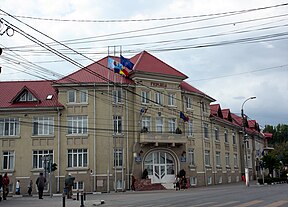
Back Giurgiu ACE جورجيو Arabic Curcu Azerbaijani جورجی AZB Джурджу Byelorussian Гюргево Bulgarian Giurgiu Catalan Municipiul Giurgiu CEB Giurgiu Czech Giurgiu Danish
You can help expand this article with text translated from the corresponding article in Romanian. (February 2013) Click [show] for important translation instructions.
|
Giurgiu | |
|---|---|
| Coordinates: 43°54′03″N 25°58′26″E / 43.90083°N 25.97389°E | |
| Country | Romania |
| County | Giurgiu |
| Government | |
| • Mayor (2020–2024) | Adrian Anghelescu[1] (PNL) |
Area | 46.94 km2 (18.12 sq mi) |
| Elevation | 25 m (82 ft) |
| Population (2021-12-01)[2] | 54,551 |
| • Density | 1,200/km2 (3,000/sq mi) |
| Time zone | EET/EEST (UTC+2/+3) |
| Postal code | 080011–080882 |
| Area code | (+40) 02 46 |
| Vehicle reg. | GR |
| Website | www |
Giurgiu (Romanian pronunciation: [ˈdʒjurdʒju] ⓘ; Bulgarian: Гюргево, romanized: Gyurgevo) is a city in southern Romania. The seat of Giurgiu County, it lies in the historical region of Muntenia. It is situated amongst mud-flats and marshes on the left bank of the Danube facing the Bulgarian city of Ruse on the opposite bank. It is one of six Romanian county seats lying on the Danube river. Three small islands face the city, and a larger one shelters its port, Smarda. The rich grain-growing land to the north is traversed by a railway to Bucharest, the first line opened in Romania, which was built in 1869 and afterwards extended to Smarda. In the past, Giurgiu exported timber, grain, salt and petroleum, and imported coal, iron, and textiles.[3]
The Giurgiu-Ruse Friendship Bridge, in the shared Bulgarian-Romanian section of the Danube, crosses the river in the outskirts of the city.
- ^ "Results of the 2020 local elections". Central Electoral Bureau. Retrieved 8 June 2021.
- ^ "Populaţia rezidentă după grupa de vârstă, pe județe și municipii, orașe, comune, la 1 decembrie 2021" (XLS). National Institute of Statistics.
- ^ One or more of the preceding sentences incorporates text from a publication now in the public domain: Chisholm, Hugh, ed. (1911). "Giurgevo". Encyclopædia Britannica. Vol. 12 (11th ed.). Cambridge University Press. p. 54.





